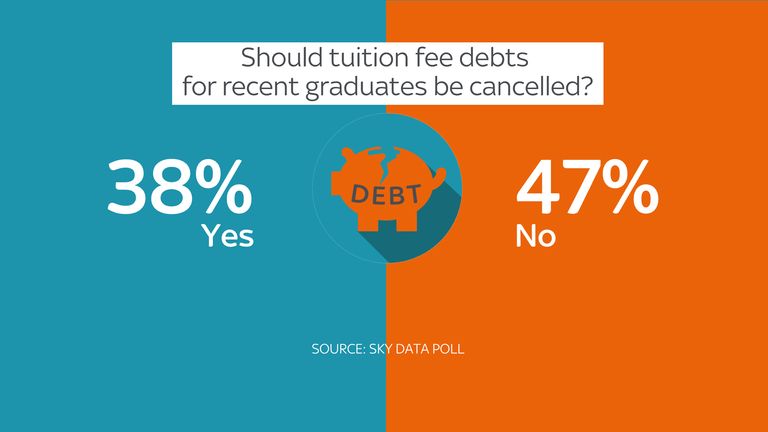Is going to university worth the average 拢57k debt it saddles you with?
Two Sky journalists debate whether attending higher education is beneficial when the cost of it can take decades to pay off.
Thursday 21 September 2017 15:36, UK
A recent study by the Institute of Fiscal Studies found that poorer students will graduate with average debts of 拢57,000.
Increasing numbers of people are questioning whether the advantages of attending a higher education institution outweigh such .
Here, two Sky News writers argue whether, today, it is worth going to university.
NO
By Sam Kiley, Foreign Affairs Editor
In a moment of sneering self parody, Jimmy Porter regrets that he went to a university that was "not even red brick but white tile".
Nowhere have the hangups, the British competitive obsession with class, and opportunities for social mountaineering been so vivid, since that telling phrase was first used in John Osborne's Look Back in Anger in 1956, than in higher education.
Five decades later and the dismay in the original angry young man still rings through the generations.
::
Except, today, the young men and young women who have accumulated huge debts in pursuing the dream of social and economic advancement, promised by the vast expansion of higher education, have every reason to be looking not back, but forwards, in rage.
Many tens of thousands of young people have been conned. Conned into thinking that a degree in philosophy or media studies, any non-vocational course for that matter, taken at an obscure college recently ennobled as a "university" is worth what they paid for it.
It isn't. Higher education establishments have no national benchmark of quality for their teaching. Nor for the quality of the degrees they sell. So the British fall back into the familiar comfort of snobbery.
An Oxbridge degree is seen as tip-top. Next down are those from the Russell Group universities (the group is a self selecting club of "elite", mostly red-brick institutions). Then come the "white tiles", then the former polytechnics.
This is a tragedy. And a cynical ripoff. A philosophy tutor at a former poly once told me that the standards expected of his final year students were "sub O level".
In pursuit of the middle class fantasy that the only form of tertiary education worth having was a university degree, Britain has indulged in national self-mutilation. First cut was the transformation of all polytechnics into universities.
This meant ending the tight world-class focus many of them had. They rushed to offer a full range of subjects rather than maintain pre-eminence in a few.
Students who had little interest and little to gain in studying watered-down degrees, just to get undergraduate bums on seats.
Respect for vocational courses, especially those which did not result in a degree, evaporated.
Young people with talents unsuited to academia were suckered into tenth-rate courses rather than the pursuit of a trade or skill through which intellectual and economic satisfaction could be found.
Blinking and betrayed they emerge into a workplace where they find themselves in non-graduate jobs, unable to advance their dreams and saddled with £40,000 of debt.
There are a quarter of a million skilled jobs unfilled in the construction industry right now. The UK needs to import gigantic numbers of workers for the NHS and to keep the wheels of industry turning.
There is a vast non-graduate world of jobs and small business opportunities not being explored and exploited because of the British fetish for degrees, from not-even-white-tile universities, that are simply not worth the paper they are written on. What a waste.
YES
By Adam Parsons, Business Correspondent
You don't need a degree to know that universities are good for the health of a country.
They educate people, stimulate research and prepare a nation for the needs of the modern world. Without higher education, we'd be a duller, less ambitious nation.
It's obvious that not everyone needs to go to university, just as it's clear there's a legitimate debate to be had about how we fund higher education.
But the problem is that those arguments often obscure a crucial conversation - the one about how we blend higher education into the fabric of the rest of the nation.
And that is important. Ask yourself this - what is British industry really good at? In which fields do we take on the world?
The answer you'll come up with is, almost invariably, a list of difficult, complicated things.
The UK is a world leader in innovative engineering, artificial intelligence and financial services, in product design, medical research and electronics.
These are fearsomely complex subjects that require big-money investment, and well-educated workers. People, in other words, who've come through the university system with at least one degree to their name.
You see, the die is cast for the UK economy. There is no way we're ever going to thrive on the international stage as a home for low-cost production.
If you want something made cheaply, you'll go to China, Bangladesh, Vietnam or plenty of other places that have got huge, cheap work forces.
There is, I think, only one low-cost area in which the UK truly excels, and that is the manufacture of sandwiches. We're the best in the world at that, but in every other area of brilliance, we rely on having a highly-educated workforce.
So that's what businesses want - a supply of people trained for the demands of a changing, advancing world.
It's reckoned that the number of jobs requiring a higher education qualification is going to rise to 46% by 2022, and it's clear that, in some areas, we simply don't always have the supply of graduates to fill that need.
Just last week, Sir James Dyson told Sky News that he was frustrated by the "antipathy" of British people towards engineering.
"We are not playing catch-up - we are simply falling further behind," he said. "The Philippines and Mexico are both producing more engineers than we do. Our schools have lost interest in engineering."
His response was quite extreme - he's setting up his own university - but there is a crucial point here.
As a nation we need to think about that warning, identify the areas of growth and invest in both the technology and the education.
We need universities and business to work closer together, as high-tech start-ups do so successfully in Cambridge.
We probably need to get rid of the idea that all universities do all subjects, and encourage more specialism.
As for me, I studied history at university, a course that develops exactly the sort of skills that a journalist needs.
My university experience was about a lot more than just learning, though - it taught me how to deal with problems, friendships, time and, yes, hangovers.
It taught me how to captain a football team, how to think on my feet, and how to analyse events with a level head. It was the most important formative experience of my life
It's not for everyone, but it's crucial for many.
Every successful modern economy has a thriving system of higher education.
Innovative and difficult industries are at the heart of Britain's future and without a supply of highly-trained graduates, they'll be in danger of withering away.









